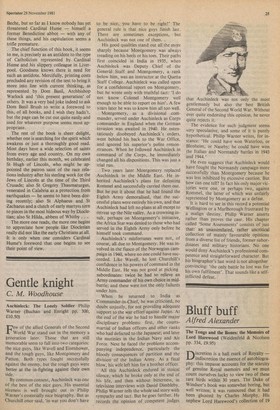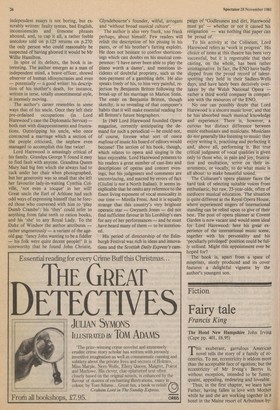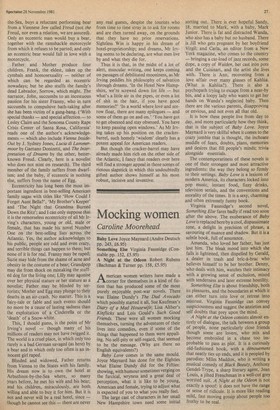Bluff buff
Alfred Alexander
The Tongs and the Bones: the Memoirs of Lord Harewood (Weidenfeld & Nicolson pp. 334, £9.95) Discretion is a hall mark of Royalty — indiscretion the essence of autobiography: this impasse accounts for the scarcity of genuine Royal memoirs and we must count ourselves lucky to view two of these rare birds within 30 years. The Duke of Windsor's book was somewhat boring, but well written; it was rumoured that it had been ghosted by Charles Murphy. His nephew Lord Harewood's collection of 19 independent essays is not boring, but execrably written: faulty syntax, bad English, inconsistencies and tiresome phrases abound, and, to cap it all, a rather feeble anecdote told on p.125 returns on p.270: the only person who could reasonably be suspected of having ghosted it would be Mr Willie Hamilton.
In spite of its defects, the book is interesting. The author emerges as a man of independent mind, a brave officer, shrewd observer of human idiosyncrasies and even — potentially — a good writer: his description of his mother's death, for instance, written in terse, totally unsentimental style, is intensely moving.
The author's career resembles in some ways that of his uncle. Once they left their pre-ordained occupations (in Lord Harewood's case the Diplomatic Service) — both met with disappointments and frustrations. Outstripping his uncle, who once contracted a marriage which a section of the people criticised, the nephew even managed to accomplish this feat twice!
Lord Harewood is amusingly critical of his family. Grandpa George V found it easy to find fault with anyone. Grandma Queen Mary had big feet which she always had to tuck under her chair when photographed, but her generosity was so small that she left her favourite lady-in-waiting Cynthia Colville, 'not even a tocque' in her will! Great uncle the Earl of Athlone had such odd ways of expressing himself that he forced those who conversed with him to 'play Dumb Crambo': his 'they' could refer to anything from false teeth to ration books, and his 'she' to any Royal Lady. To the Duke of Windsor the author attributes — rather ungenerously — a variant of the ageold gag: 'fancy John wanting to be a fiddler — his folk were quite decent people!' It is noteworthy that he found John Christie, Glyndebourne's founder, wilful, arrogant and 'without broad musical culture'.
The author is also very frank, too frank perhaps, about himself. Few readers will relish the description of his pissing in his pants, or of his brother's farting exploits. He does not hesitate to confess shortcomings which cast doubts on his musical competence: 'I have never been able to play the piano worth a damn', and mentions incidents of doubtful propriety, such as the non-payment of a gambling debt. He also speaks freely of his, to him very painful, rejection by Benjamin Britten following the break-up of his marriage to Marion Stein. The essay on Benjamin Britten, though sketchy, is so revealing of that composer's habits that it will make essential reading for all Britten's future biographers.
In 1949 Lord Harewood founded Opera magazine, correctly anticipating the demand for such a periodical — he could not, of course, foresee what sort of cosca mafiosa of music his board of editors would become! The section of his book, though, which relates to opera and singing is the least enjoyable. Lord Harewood presents to his readers a great number of cast-lists and descriptions of operas and concert evenings, but his judgments and comments are unconvincing, and marred by errors of fact (Giulini is not a North Italian). It seems inexplicable that he omits any reference to the finest living exponent of vocal musicality in our time — Mirella Freni. And it is equally strange that this country's very brightest operatic star — Gwyneth Jones — did not find sufficient favour in his Lordship's ears for any of her performances — and he must have heard many of them — to be mentioned.
His period of directorship of the Edinburgh Festival was rich in ideas and innovations and the Scottish Daily Express's cam paign of 'Godlessness and dirt, Harewood must go' — whether or not it caused his resignation — was nothing that paper can be proud of.
To his activity at the Coliseum, Lord Harewood refers as 'work in progress'. His choice of items at this theatre has been very successful, but it is regrettable that their casting, on the whole, has been rather unimaginative. In fact, the ENO have badly slipped from the proud record of talentspotting they held in their Sadlers-Wells days, and have lately been decisively overtaken by the Welsh National Opera — rather a third world company in comparison with the resources of the ENO.
No one can possibly doubt that Lord Harewood is a sincere music lover, and that he has absorbed much musical knowledge and experience. There is, however, a curious but distinct difference between music enthusiasts and musicians. Musicians do not generally like listening to music: they enjoy writing it, practising and perfecting it and, above all, performing it. But true critical judgment of vocal qualities is given only to those who, in pain and joy, frustration and exultation, strive on their instruments, or vocally, to do what music is all about: to make beautiful sound.
The Coliseum's opera planner faces the hard task of selecting suitable voices from enthusiastic, but raw, 23-year-olds, often of mediocre musical education. The situation is quite different at the Royal Opera House, where experienced singers of international standing can be relied upon to give of their best. The post of opera planner at Covent Garden is now vacant and would seem ideal for Lord Harewood: here his great experience of the international music scene, together with his personality and his 'peculiarly privileged' position could be fully utilised. Might this appointment ever be hoped for?
The book is, apart from a spate of misprints, nicely produced and its cover features a delightful vignette by the author's youngest son. the-Sea, buys a reluctant performing bear from a Viennese Jew called Freud (not the Freud, nor even a relation, we are assured). Only an eccentric man would buy a bear, together with the ramshackle motorcycle from which it refuses to be parted; and only an eccentric bear would fall in love with a motorcycle.
Father and Mother produce four children. Frank, the eldest, takes up the cymbals and homosexuality — neither of which can be regarded as eccentric nowadays; but he also stuffs the family's dead Labrador, Sorrow, which might. The narrator, John, succumbs to an incestuous passion for his sister Franny, who in turn succumbs to compulsive bath-taking after she has been victim of a gang-bang. (`With special thanks — and special affection — to Lesley Claire and the Sonoma County Rape Crisis Center of Santa Rosa, California' reads one of the author's acknowledgements — which also include Vienna InsideOut by J. Sydney Jones, Lucia di Lammermoor by Gaetano Donizetti, and The Interpretation of Dreams by the other, betterknown Freud. Clearly, here is a novelist who does not stint on research). The third member of the family suffers from dwarfism; and the baby, if eccentric in nothing else, suffers from the name of Egg.
Eccentricity has long been the most important ingredient in best-selling American family sagas with titles like 'How Could I Forget Aunt Bella?', 'My Brother's Keeper' and 'The Night that Grandma Burned Down the Ritz'; and I can only suppose that it is the remorseless eccentricity of all Mr Irving's characters, young or old, male or female, that has made his novel Number One on the best-selling lists across the Atlantic. Yes, the author acknowledges to his public, people are odd and even crazy, and terrible things can happen to them; but none of it is for real. Franny may be raped; Suzie may hide from the shame of acne and obesity in the costume of a bear; Grandpop may die from shock on mistaking the stuffed dog for the living one; Lilly may agonise over her physical stature or her stature as a novelist; Father may be blinded by terrorists; Mother and Egg may plunge to their deaths in an air-crash. No matter. This is a fairy-tale or fable and such events should no more be a cause of lasting sadness than the exploitation of a Cinderella or the 'death' of a Snow-white.
This, I should guess, is the point of Mr Irving's novel — though many of his millions of readers may not have twigged it. The world is a cruel place, in which only too rarely is a bad German savaged (as here) by a bear and in which only too often is an innocent girl raped.
Blinded and widowed, Father returns from Vienna to the States with his family. His dream now is to own the hotel at Arbuthnot-by-the-Sea where, so many years before, he met his wife and his bear; and his children, miraculously, are both willing and able to buy it for him. But it is not and never will be a real hotel, since — though he cannot see this — there are never any real guests, despite the tourists who from time to time stray in to ask for rooms and are then turned away, on the grounds that they have no prior reservations. Sightless Win is happy in his dream of hotel-proprietorship; and dreams, Mr Irving seems to be declaring, are what men live by and what they die for.
Thus it is that, in the midst of a lot of alert, muscular writing, one keeps coming on passages of debilitated mooniness, as Mr Irving peddles his philosophy of salvation through dreams. 'In the Hotel New Hampshire, we're screwed down for life — but what's a little air in the pipes, or even a lot of shit in the hair, if you have good memories?' 'In a world where love and sorrow float, there are many epilogues — and some of them go on and on.' You have got to get obsessed and stay obsessed. You have to keep passing open windows.' As Mr Irving takes up his position on the crackerbarrel, such homely 'wisdom' clearly has a potent appeal for American readers.
But though the cracker-barrel may have already made him rich on the other side of the Atlantic, I fancy that readers over here will find a stronger appeal in those scenes of riotous slapstick in which this undoubtedly gifted author shows himself at his most robust, incisive and inventive.
















































 Previous page
Previous page